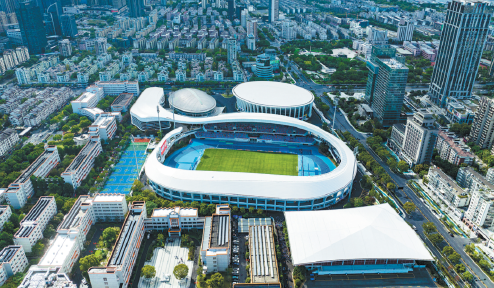Hangzhou's Linping district shines as Asian Games host

Policies and measures are launched to allow the public to enjoy dividends of the event
Input from local governments is ensuring that participants in the 19th Asian Games in Hangzhou, East China's Zhejiang province, are provided with outstanding service and that the event will provide lasting benefits for area residents.
As one of the Games hosts in the city, Linping district is organizing three events — karate, football and volleyball — and the Para events of sitting volleyball and blind football, which will produce a total of 19 gold medals.
Shen Wei, head of the district's communications department, said that since the beginning of the year Linping implemented the concept of simplicity, safety and the pursuit of excellence in preparing for the Games, overarching the objective of hosting a successful event and elevating the city's profile. District officials coordinated with various departments, towns and street administrations to streamline the process.
Infrastructure
Linping Sports Centre Venue Cluster is designed in the shape of a flexible curve to demonstrate the concept of the Silk Road, while the Tangxi Football Training Base for the Blind is the only private-owned venue designated for the Para Games. Built about 10 years ago, the renovated barrier-free facilities have been fully recognized by the Games organizing committee and the China Disabled Persons Federation.
Meanwhile, Linping's focus on major actions aimed at creating a better urban image resulted in the renovation of 11 entrances to the city and 18 commuting routes.
Additionally, seven former residential areas were refurbished and an Asian Games volunteer service system was established, consisting of 140,000 volunteers organized into 3,000 teams.
"To create an Asian Games atmosphere, we have focused on the venues and created an Asian Games viewing space in the People's Square," said Shen. "We have added flags at more than 50 overpasses along the Asian Games and Asian Para Games commuting routes, installed some 100 large-scale public service advertisements and set up more than 200 public art installations with the Asian Games themes."
The district also opened 15 English-learning "corners" staffed with more than 2,000 volunteers. More than 500,000 participants joined in the activities to learn rudimentary English and expand their knowledge of the Games.
Historical legacy
Linping has a history of civilization, written records and urban construction dating back thousands of years. The district encompasses 40 kilometers of the Grand Canal, a UNESCO World Heritage Site; the Guangji Bridge, the only seven-arch stone canal bridge in China; the Tangxi Ancient Town, built during the Ming (1368-1644) and Qing (1644-1911) dynasties; and the Chaoshan Mountain, one of southern China's most popular tourist destinations.
"Since the beginning of the year, we have continued to promote the cultural inheritance based on the Grand Canal and made every effort to promote construction of the Song Dynasty (960-1279)-based cultural belt along the Shangtang River," Shen said.
The local government has also promoted the creation of more than 120 literary and artistic masterpieces, including the sports-themed drama In Linping: Setting off to Happiness, which is about to be released.
With the opening of the Hangzhou Wenrun Reading Room and recent release of six Games-themed tourism routes, the E-fashion Town, Tangxi Ancient Town Scenic Area and Museum of Chinese Jiangnan Watertown Culture all elevated their tourism profiles.
To allow the public to enjoy post-Games dividends, Linping district has emphasized urban-industrial integration and expansion of the industrial capabilities.
"We will make good use of Asian Games venues, introduce new forms of events and Asian Games exhibitions and forums," said Shen. "We will expand the usage of sports facilities and sports space and build up a quality athletic circle for all."
The district is promoting the core area of urban culture, tourism and leisure activities and developing the nighttime economy and exhibition economy to create a new type of shopping and entertainment center in eastern Hangzhou.
"We will also develop new cultural industries such as online micro-dramas, host the China-Arab Broadcasting and Television Summit and the Hangzhou Micro-drama Conference," Shen added.
"We will make a good use of the local film and television bases, ancient costume shooting bases and film and television industrial parks. We will continue to promote the deep integration of Asian Games culture and Linping's history while strengthening the coordinated operation and value interpretation of State-owned cultural assets."




















